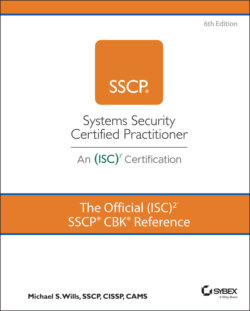Читать книгу The Official (ISC)2 SSCP CBK Reference - Mike Wills - Страница 177
Role-Based
ОглавлениеRole-based access control (RBAC) grants specific privileges to subjects regarding specific objects or classes of objects based on the duties or tasks a person (or process) is required to fulfill. Several key factors should influence the ways that role-based privileges are assigned.
Separation of duties takes a business process that might logically be performed by one subject and breaks it down into subprocesses, each of which is allocated to a different, separate subject to perform. This provides a way of compartmentalizing the risk to information security. For example, retail sales activities will authorize a salesclerk to accept cash payments from customers, put the cash in their sales drawer, and issue change as required to the customer. The salesclerk cannot initially load the drawer with cash (for making change) from the vault or sign off the cash in the drawer as correct when turning the drawer in at the end of their shift. The cash manager on duty performs these functions, and the independent counts done by salesclerk and cash manager help identify who was responsible for any errors.
Need to know, and therefore need to access, should limit a subject's access to information objects strictly to those necessary to perform the tasks defined as part of their assigned duties, and no more.
Duration, scope, or extent of the role should consider the time period (or periods) the role is valid on and any restrictions as to devices, locations, or factors that limit the role. Most businesses, for example, do not routinely approve high-value payments to others after business hours or normally consider authorizing these when submitted (via their approved apps) from a device at an IP address in a country with which the company has no business involvement or interests. Note that these types of attributes can be associated with the subject (such as role-based), the object, or the conditions in the system and network at the time of the request.
Role-based access has one strategic administrative weakness: privilege creep. This unnecessary accumulation of privileges or the retention of privileges no longer strictly required for the performance of one's duties can put the organization and the individual employee at considerable risk. Quality people take on broader responsibilities to help the organization meet new challenges and new opportunities; and yet, as duties they previously performed are picked up by other team members or as they move to other departments or functions, they often retain the access privileges their former jobs required. To contain privilege creep, organizations should review each employee's access privileges in the light of their currently assigned duties, not only when those duties change (even temporarily!) but also on a routine, periodic basis.
